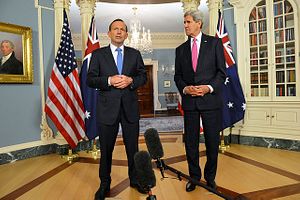He has only been in office for just over 12 months yet Tony Abbott has already completed more than 12 overseas trips as prime minister. Abbott’s transformation from the stay-at-home Opposition leader into a head of government increasingly comfortable strutting the world stage has been something of a revelation. This time last year, the man well known for his biting parochial sloganeering would hardly have attracted the title of “globalist,” from either his supporters or detractors.
In opposition, Abbott was brutal in savaging both Kevin Rudd and Julia Gillard for their international trips. He scorned Rudd with the epitaph “Kevin 747” and derided Gillard for “swanning” around in New York “talking to Africans.” Even on the eve of his election victory, with the keys to The Lodge dangling within reach, Abbott was dismissive of Australia’s capacity to influence world events. Asked if Australia should support American airstrikes in Syria, Abbott retorted: “I don’t think we should be getting ideas above our station.”
This remarkably modest attitude to foreign policy as Opposition leader came at a time of Australia’s growing role on the world stage, from assuming the chairmanship of the G20 to earning a seat on the UN Security Council. As Nick Bryant, former BBC correspondent to Australia, reflects in his recent book, The Rise and Fall of Australia, Abbott’s conduct in opposition gave the impression he was “competing to become the mayor of a medium size city rather than contesting the leadership of an ever more thrusting and consequential nation.”
And so, on the one-year anniversary of the Abbott Government, it must come as a surprise to many to realize that Abbott had rivaled Rudd’s globetrotting forays. Of course, such air miles are in large part due to the fact that Abbott has had to respond to more international crises than other prime ministers might in their first term – let alone their first year. Nevertheless, putting aside the volume of his travel, there has been a very marked shift in Abbott’s, and the government’s, rhetoric regarding Australia’s responsibility and capability to not only advance its own interests but also those of the wider international community. This was evident in his handling of the downing of Malaysia Airlines Flight MH17 and in his recent robust response to the rise of the Islamic State in the Middle East. Julie Bishop herself seemed to acknowledge this change when she declared last month, in direct contrast to Abbott’s once overly modest outlook, that Australia has found a “new station.”
Clearly, there could be many explanations behind Abbott’s newfound interest in flexing Australia’s diplomatic muscles, not least an attempt to divert media attention away from his deeply unpopular budget. Nonetheless, perhaps it is also fair to say that, confronted by recent events, Abbott has finally had to confront the reality that Australia is not simply – to steal a line from the English poet John Donne – “an island entire of itself.” What happens overseas can and does affect Australians. The country’s prosperity, health, safety and success are fundamentally linked to people on the other side of the planet.
Moreover, perhaps after watching Julie Bishop’s deft execution of Australian foreign policy, Abbott has also accepted what we have been arguing for a while: Australia does matter in the world. Gone is the notion of Little-Australia – a small colonial outpost in the far-flung corner of the world. Ranking amongst the top 15 countries in most serious economic and military listings, Australia actually is capable of making a difference on the global and regional stage.
Having seemingly jettisoned his previously modest foreign policy ambitions, the test for Abbott now will be in ensuring his newly acquired interest in “fundamentally humanitarian” endeavors translates into positive long-term change. Will he, on the one hand, send troops for legitimate short-term security and humanitarian missions; while on the other, continue to disregard and gut aggressively Australia’s long-term overseas aid program, which addresses the root causes of these conflicts? Similarly, will he, in one breath, morally condemn the horrors committed by the perpetrators – including those carrying Australian passports – in Middle Eastern conflicts, but, with his next, defend our current, and by most standards pitiful, intake of refugees from such besieged countries? And finally, will he directly accept moral responsibility to safeguard global security and stability against one threat: political terrorist groups; but, in even refusing to attend international meetings on the subject matter, will he continue to willfully turn a blind eye to another threat: the dire consequences of irreversible climate change?
It has been said recently that Abbott has finally started to appear prime ministerial for the first time. But it takes one level of leadership to shape responses to international crises as they happen. It takes quite another kind – the kind that broad-visioned statesmen embody – to make the long-term investments to curtail disasters before they erupt and compassionately deal with the plight of its victims after such calamities hit. Only time will tell whether Tony Abbott is capable of undergoing such a metamorphosis. But stranger things have happened, right?
Michael Sheldrick is currently the Head of Global Policy and Advocacy with the New York-based Global Poverty Project and was Young Western Australian of the Year in 2013. Follow him on Twitter @micksheldrick. Akram Azimi was 2013 Young Australian of the Year. He is co-founder of the “I am the Other” group and has been an active campaigner around Australia’s foreign aid program. Follow him on Twitter @AkramAzimi.

































